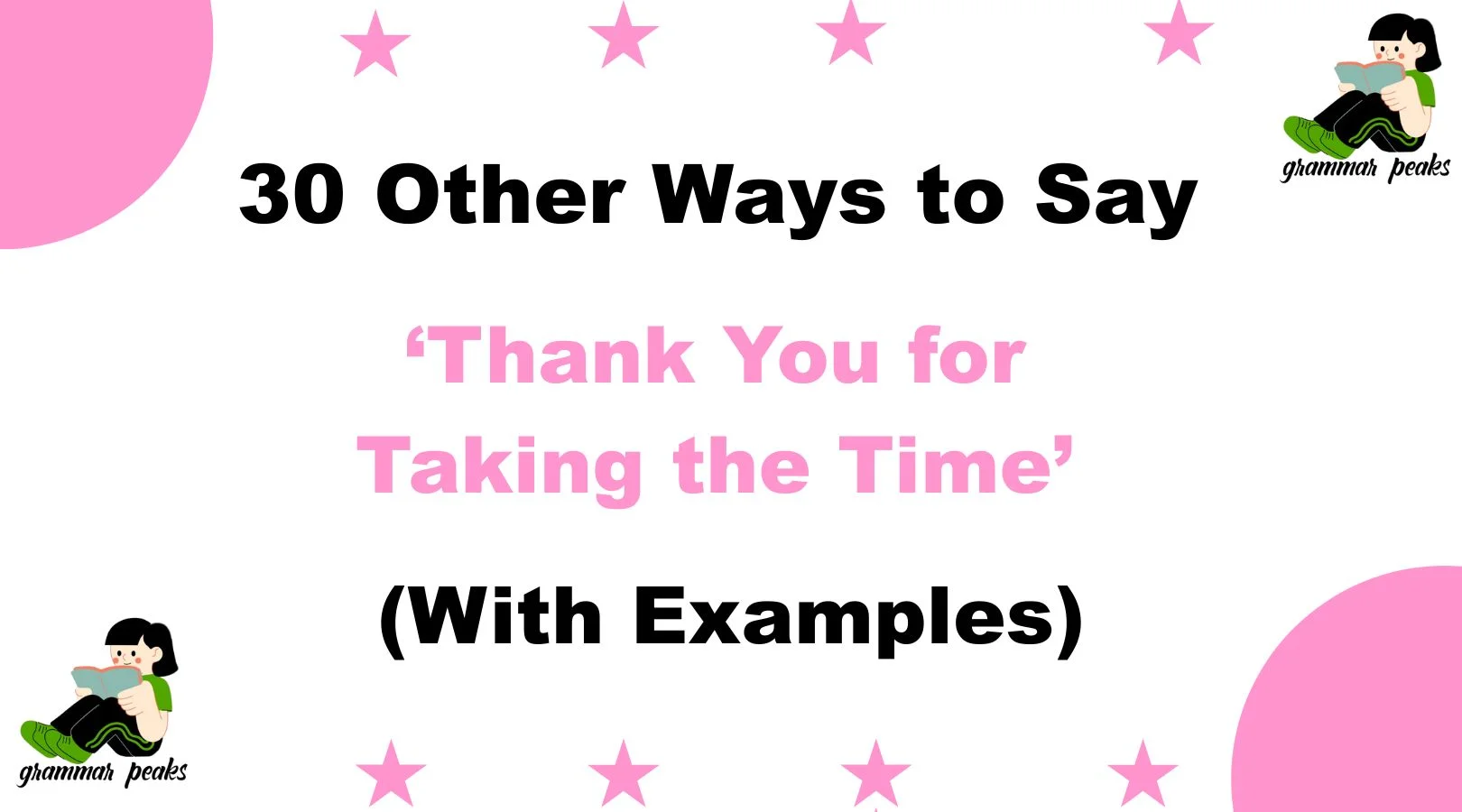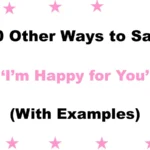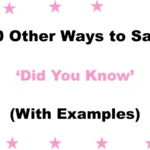Finding the right words to show appreciation can make all the difference—especially in a world where time is a gift. Saying “Thank you for taking the time” is polite, but sometimes, a more personal, expressive alternative adds the warmth and care that helps your message feel genuinely memorable. Whether you’re emailing a colleague, replying to a client, or following up after a meeting, these alternatives can help you strike the perfect tone—respectful, thoughtful, and fully professional.
Let’s explore more meaningful ways to show appreciation—each one designed to resonate with your audience and elevate your communication with grace and clarity.
What Does “Thank You for Taking the Time” Mean?
“Thank you for taking the time” is a professional and respectful way to acknowledge that someone chose to spend part of their day focused on you, your message, or your request. It shows that you recognize their effort, availability, and willingness to engage—even if briefly.
Whether you’re referring to a meeting, an email, a review, or a conversation, this phrase communicates gratitude for their attention and presence. In fast-paced professional environments, taking time is a conscious decision, so expressing appreciation for it helps build rapport, trust, and a tone of mutual respect.
When to Use “Thank You for Taking the Time”
● After a Meeting or Interview
● In Follow-Up Emails
● When Requesting Feedback
● During Conflict Resolution or Difficult Discussions
Is It Professional/Polite to Say “Thank You for Taking the Time”?
Yes, “Thank you for taking the time” is both professional and polite, making it a widely accepted phrase in business and formal communication. It conveys genuine appreciation without sounding overly casual or emotional. This expression shows that you value someone’s effort and acknowledge that their time is limited and valuable. Whether you’re addressing a colleague, supervisor, client, or potential employer, using this phrase demonstrates emotional intelligence, respect, and good etiquette—all essential in building and maintaining positive professional relationships.
Pros and Cons for saying “Thank You for Taking the Time”
Pros:
- Shows genuine respect
- Universally understood
- Works in any business context
Cons:
- Can feel overused or impersonal
- Might lack emotional warmth
- Sounds like a script in high-frequency use
Synonyms for “Thank You for Taking the Time”
- I truly appreciate your time
- I’m grateful you made time for this
- Thank you for your attention
- I value the time you shared
- I appreciate your thoughtful consideration
- Many thanks for your time
- I’m thankful for your input
- I appreciate your effort and time
- Grateful for your willingness to engage
- Thanks for your time and insights
- Your time is greatly appreciated
- I truly value your time and perspective
- Thank you for taking a moment
- Sincerely grateful for your time
- Thank you for devoting time to this
- I appreciate your prompt response
- Thanks for carving out time
- Thank you for fitting me into your day
- I value your contribution
- Thanks for dedicating your attention
- I’m thankful for your patience and time
- Thank you for your thoughtful reply
- I appreciate the opportunity to connect
- Your attention to this means a lot
- Thank you for engaging with me
- Appreciate your dedication to this
- Thank you for being available
- Thank you for stepping in
- Appreciate the time you took to review
- Thanks for lending your time today
1. I truly appreciate your time
Definition: This phrase expresses deep gratitude for someone’s time.
Detailed Explanation: It emphasizes sincerity and acknowledges the personal cost of the time someone has given you. It sounds respectful without being overly formal.
Scenario Example: You just finished a Zoom call with a client, and you say, “I truly appreciate your time today—it helped clarify so much.”
Best Use: After a meeting, interview, or lengthy call where someone took time out of their day.
Worst Use: In a rushed context, like a one-line email—it may come across as filler.
Tone: Warm, sincere, slightly formal
2. I’m grateful you made time for this
Definition: A heartfelt way to show thanks when someone has rearranged or prioritized their schedule for you.
Detailed Explanation: It conveys that you understand the value of their time and appreciate their effort to participate.
Scenario Example: After a client squeezes in a meeting: “I’m grateful you made time for this—it means a lot.”
Best Use: When someone clearly adjusted their schedule or went out of their way.
Worst Use: If it wasn’t a big ask—it could feel overly dramatic.
Tone: Appreciative, warm, personal
3. Thank you for your attention
Definition: A polite and formal way to show appreciation, especially in written formats.
Detailed Explanation: It acknowledges that the recipient focused on your message, which is key in written or presentation contexts.
Scenario Example: In a project update email: “Thank you for your attention to these details.”
Best Use: Emails, reports, and formal documents.
Worst Use: Casual or friendly chats—it can sound robotic.
Tone: Professional, polite, slightly distant
4. I value the time you shared
Definition: A respectful nod to someone offering their time and presence.
Detailed Explanation: This adds emotional weight and acknowledgment to the gesture of sharing time, especially in collaborative efforts.
Scenario Example: In a follow-up email: “I value the time you shared during our discussion.”
Best Use: Peer-to-peer communications or client follow-ups.
Worst Use: In high-pressure sales—it might feel manipulative.
Tone: Thoughtful, calm, respectful
5. I appreciate your thoughtful consideration
Definition: Thanks to someone for not only their time but also their reflection and insight.
Detailed Explanation: It works well when someone reads or evaluates something, like a proposal or resume.
Scenario Example: After sending a grant request: “I appreciate your thoughtful consideration of our submission.”
Best Use: Evaluations, proposals, or requests.
Worst Use: In brief interactions—it may sound overly heavy.
Tone: Polished, respectful, formal
6. Many thanks for your time
Definition: A classic and simple expression of gratitude for someone’s time.
Detailed Explanation: This phrase keeps it professional yet friendly. “Many thanks” adds warmth while maintaining courtesy, and it fits neatly into both formal and casual settings.
Scenario Example: After an initial consultation: “Many thanks for your time today—it was incredibly helpful.”
Best Use: Professional follow-ups, interviews, and first meetings.
Worst Use: Informal chats—may feel too polished or distant.
Tone: Polite, classic, versatile
7. I’m thankful for your input
Definition: A way to thank someone for contributing their time and ideas.
Detailed Explanation: It blends gratitude for both time and participation, ideal for meetings, brainstorms, and reviews where input matters.
Scenario Example: After a feedback session: “I’m thankful for your input—it gave me clarity moving forward.”
Best Use: Team collaborations, reviews, and discussions.
Worst Use: If the recipient didn’t actually provide feedback—it’ll feel forced.
Tone: Appreciative, team-focused, engaging
8. I appreciate your effort and time
Definition: A phrase that recognizes both the act and the energy spent.
Detailed Explanation: This shows that you’re not only thankful for the clocked minutes but also the attention and care someone offered.
Scenario Example: After a colleague supports a presentation: “I appreciate your effort and time preparing this with me.”
Best Use: When someone’s gone above the basic expectation.
Worst Use: For automated replies—it needs a human touch.
Tone: Respectful, sincere, encouraging
9. Grateful for your willingness to engage
Definition: This phrase thanks someone for not just showing up but being mentally present and involved.
Detailed Explanation: It highlights initiative and interest—useful in debates, collaborations, or tough conversations.
Scenario Example: After a difficult meeting: “Grateful for your willingness to engage in today’s dialogue.”
Best Use: For collaborative problem-solving or negotiations.
Worst Use: Routine interactions—it might feel too heavy.
Tone: Thoughtful, serious, validating
10. Thanks for your time and insights
Definition: A professional thank-you that combines time with the value of shared ideas.
Detailed Explanation: This goes beyond just being polite—it shows that what they said mattered and helped you.
Scenario Example: Post-client call: “Thanks for your time and insights—I’ll put those suggestions into action.”
Best Use: Mentorship, client consults, and advisory conversations.
Worst Use: Without meaningful discussion—it feels hollow.
Tone: Intellectual, collaborative, respectful
11. Your time is greatly appreciated
Definition: A formal expression of gratitude, ideal for business writing.
Detailed Explanation: This emphasizes gratitude without emotion-heavy language, keeping it neutral and professional.
Scenario Example: In an email: “Your time is greatly appreciated—we’ll follow up next week.”
Best Use: Formal settings, project updates, reports.
Worst Use: Friendly or humorous conversations.
Tone: Professional, courteous, neutral
12. I truly value your time and perspective
Definition: Combines gratitude for someone’s presence and their unique views.
Detailed Explanation: This adds emotional depth—recognizing not just the time, but the person behind it.
Scenario Example: After a collaborative workshop: “I truly value your time and perspective—it added so much.”
Best Use: Peer feedback, coaching, and deep collaboration.
Worst Use: Routine replies—it may feel overdone.
Tone: Heartfelt, intellectual, engaging
13. Thank you for taking a moment
Definition: A more casual variation acknowledging a quick but appreciated action.
Detailed Explanation: Perfect for short interactions where someone paused to help or respond.
Scenario Example: After someone reads a quick message: “Thank you for taking a moment to consider this.”
Best Use: Quick replies, social media messages, or check-ins.
Worst Use: Long engagements—it can understate the effort.
Tone: Casual, brief, friendly
14. Sincerely grateful for your time
Definition: A formal and deeply appreciative message of thanks.
Detailed Explanation: It adds sincerity and formality, ideal for written messages that require a respectful close.
Scenario Example: After a formal meeting: “Sincerely grateful for your time and attention today.”
Best Use: Official communications, formal events.
Worst Use: Informal chats—it can feel stiff.
Tone: Formal, elegant, respectful
15. Thank you for devoting time to this
Definition: Shows appreciation for dedicated time spent on a task or project.
Detailed Explanation: “Devoting” implies care and focus, not just time spent—which makes it especially powerful in team and client work.
Scenario Example: After a proposal review: “Thank you for devoting time to this—it shows in your feedback.”
Best Use: High-effort projects, critical feedback sessions.
Worst Use: Casual or one-word responses—it overstates the gesture.
Tone: Respectful, specific, intentional
16. I Appreciate Your Prompt Response
Definition: A polite way to thank someone for replying quickly.
Detailed Explanation: It recognizes both their time and urgency in handling your request.
Scenario Example: I appreciate your prompt response—it helped us move forward on schedule.
Best Use: Client replies, team feedback, project communication.
Worst Use: Not suitable if the response wasn’t actually fast.
Tone: Grateful, professional, and timely.
17. Thanks for Carving Out Time
Definition: A casual and warm way to thank someone who adjusted their schedule for you.
Detailed Explanation: It feels personable and acknowledges effort in making time.
Scenario Example: Thanks for carving out time to discuss the proposal today.
Best Use: Internal meetings, one-on-ones, informal calls.
Worst Use: Not ideal for formal emails or executive-level correspondence.
Tone: Friendly, sincere, and conversational.
18. Thank You for Fitting Me Into Your Day
Definition: A phrase that shows deep appreciation for someone adjusting their busy schedule.
Detailed Explanation: It’s ideal when someone went out of their way to make the meeting happen.
Scenario Example: Thank you for fitting me into your day on such short notice.
Best Use: Spontaneous meetings or rescheduled appointments.
Worst Use: Doesn’t apply if the meeting was scheduled far in advance.
Tone: Appreciative, thoughtful, and casual.
19. I Value Your Contribution
Definition: A respectful way to recognize both time and input.
Detailed Explanation: It emphasizes gratitude for thoughtful involvement or shared expertise.
Scenario Example: I value your contribution during today’s strategy session.
Best Use: Team collaborations, brainstorming sessions, feedback loops.
Worst Use: Not effective if the person didn’t contribute directly.
Tone: Professional, appreciative, and respectful.
20. Thanks for Dedicating Your Attention
Definition: A refined way of saying thank you for full focus and time.
Detailed Explanation: This acknowledges not just time spent but engagement and presence.
Scenario Example: Thanks for dedicating your attention to today’s discussion.
Best Use: Performance reviews, important client calls.
Worst Use: May sound overly formal in quick chats.
Tone: Formal, focused, and respectful.
21. I’m Thankful for Your Patience and Time
Definition: A warm phrase that combines gratitude for both effort and understanding.
Detailed Explanation: Great when delays or confusion require extra patience.
Scenario Example: I’m thankful for your patience and time as we worked through those edits.
Best Use: When timelines shift, or things get complex.
Worst Use: Can feel overly emotional in purely transactional messages.
Tone: Sincere, appreciative, and human.
22. Thank You for Your Thoughtful Reply
Definition: A phrase used to recognize the care and time put into a response.
Detailed Explanation: Best when the person gives you more than a basic reply or quick feedback.
Scenario Example: Thank you for your thoughtful reply—it gave me great clarity.
Best Use: Email responses, client feedback, follow-ups.
Worst Use: Not suitable if the reply was short or vague.
Tone: Appreciative, reflective, and respectful.
23. I Appreciate the Opportunity to Connect
Definition: A phrase that shows gratitude for the chance to have a conversation or interaction.
Detailed Explanation: It’s great for networking or new professional relationships.
Scenario Example: I appreciate the opportunity to connect and explore synergies.
Best Use: Introductory calls, new partnerships, virtual coffees.
Worst Use: Not ideal for someone you already engage with daily.
Tone: Warm, professional, and open.
24. Your Attention to This Means a Lot
Definition: A phrase that emphasizes the importance of their focus on your issue.
Detailed Explanation: It goes beyond time to include dedication to details.
Scenario Example: Your attention to this means a lot—thank you for prioritizing it.
Best Use: Urgent requests, complex issues, escalations.
Worst Use: Not appropriate for small or routine tasks.
Tone: Grateful, serious, and respectful.
25. Thank You for Engaging with Me
Definition: A phrase that thanks someone for actively participating or showing interest.
Detailed Explanation: Ideal for collaborative discussions or thoughtful dialogues.
Scenario Example: Thank you for engaging with me on this topic—it’s been enlightening.
Best Use: Meaningful conversations, feedback sessions, panel discussions.
Worst Use: Feels forced if the conversation was very brief or one-sided.
Tone: Appreciative, conversational, and open.
26. Appreciate Your Dedication to This
Definition: A phrase that recognizes ongoing effort and time spent.
Detailed Explanation: Shows gratitude for someone staying involved and committed.
Scenario Example: Appreciate your dedication to this project and the time you’ve invested.
Best Use: Long-term projects, cross-team collaborations.
Worst Use: May seem exaggerated for minor tasks.
Tone: Respectful, motivational, and thankful.
27. Thank You for Being Available
Definition: A polite and professional way to thank someone for making themselves reachable.
Detailed Explanation: It’s useful in fast-moving or time-sensitive contexts.
Scenario Example: Thank you for being available this morning—I really appreciated the quick sync.
Best Use: Last-minute calls, urgent chats, tight deadlines.
Worst Use: Not applicable if scheduling wasn’t an issue.
Tone: Professional, appreciative, and flexible.
28. Thank You for Stepping In
Definition: A phrase that shows appreciation for someone jumping in or helping unexpectedly.
Detailed Explanation: A great choice when someone fills in, volunteers, or provides support.
Scenario Example: Thank you for stepping in during the meeting while I was out.
Best Use: Crisis help, temporary coverage, team support.
Worst Use: Can feel misplaced if the person wasn’t involved much.
Tone: Appreciative, direct, and respectful.
29. Appreciate the Time You Took to Review
Definition: A direct and professional way to thank someone for reviewing your work.
Detailed Explanation: It highlights that you noticed the time and effort behind their review.
Scenario Example: Appreciate the time you took to review the proposal—it really helped refine our plan.
Best Use: Review processes, feedback cycles, content checks.
Worst Use: Doesn’t work if they haven’t given feedback yet.
Tone: Professional, respectful, and thankful.
30. Thanks for Lending Your Time Today
Definition: A phrase that feels warm and collaborative when thanking someone for meeting.
Detailed Explanation: Suggests a mutual, friendly exchange rather than obligation.
Scenario Example: Thanks for lending your time today—this was a really valuable conversation.
Best Use: Partner meetings, collaborative efforts, closing conversations.
Worst Use: Too informal for formal proposals or performance reviews.
Tone: Conversational, warm, and appreciative.
Conclusion
Choosing the right words to thank someone for their time goes far beyond courtesy—it’s a small act that builds trust, respect, and genuine connection. Whether you’re closing a meeting, following up on an interview, or simply appreciating someone’s presence, a well-chosen phrase can elevate your message. It shows you see the other person not just as a participant but as someone whose time holds value.
Subtle shifts in language—like saying “I appreciate the time you carved out” or “Grateful for your insights and time”—can add warmth and sincerity. These alternatives help you stand out in both professional and personal conversations. They show emotional intelligence, attention to detail, and gratitude that feels authentic. Instead of sending a basic thank-you, tailor your message with intent. That’s how you leave a lasting impression—by recognizing someone’s time as a gift, not a given.
FAQs
1. Can I use these alternatives in professional emails?
Yes, most of these phrases are tailored for professional communication and work perfectly in follow-up emails, meeting recaps, or introductions.
2. Which phrase is best for thanking someone after an interview?
“Thank you for taking the time to speak with me” or “Appreciate your time and consideration” are excellent, polished choices for post-interview messages.
3. Are these phrases okay for formal business settings?
Absolutely. Options like “Sincerely grateful for your time” and “Appreciate the opportunity to connect” are ideal for formal contexts.
4. Can I use these in verbal communication or only in writing?
These expressions work well in both written and spoken form. They’re clear, respectful, and easy to adapt to tone and setting.
5. How do I choose the right tone for my message?
Consider the relationship and context. For formal interactions, choose respectful and polished phrases. For casual or personal ones, go with warm, conversational options.






